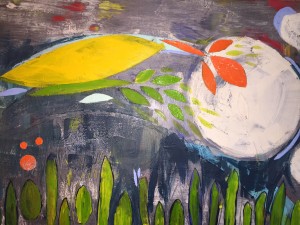What does it mean to be Intuitive?

Your sacred gift
These thoughts, feelings, and experiences may resonate with you if you have an Intuitive Mind. If you suffer from anxiety, moodiness, procrastination, loneliness, depression, and poor esteem, it may be indirectly related to your Intuitive Mind. You may feel bad about yourself as a result of these types of thoughts and invalidating experiences. Even though the world has yet to understand the value of Intuitive Intelligence, it does need you, and your gifts!
The Nine Traits
Nine traits combine to create an Intuitive Mind
High Receptivity
1. Sensory Sensitivity
Sensory sensitivity is a tendency or ability to process large amounts of sensory information, to experience discrete bits of information like a color or emotion with a high level of intensity, or to have a unique experience of the senses which leads to a heightened awareness of nuance and subtle changes in the individual's area(s) of sensory sensitivity.
2. Somatic Knowing
Somatic knowing is the ability or tendency to receive impressions via a sensory experience in the body. Information is influenced and generated by sensations in the body such as a “gut” feeling or a heart-felt sense which then produces images, ideas, and instinctive decisions. Decisions are arrived at via an experience in the body.
3. Empathic Entrainment
Empathic entrainment is the ability or tendency to experience a shift in one’s personal experience towards becoming attuned to, in-phase with, or synchronized with either one’s surroundings or another person’s emotional or somatic experience (feelings, thoughts, body sensations, mood, state, or energy level).
Connective Thinking
4. Abstract Shifting
Abstract thinking is the tendency or ability to extract one’s experience of an object, situation or information from the concrete (and often commonly shared understanding or schema) and use different contexts or symbolism in order to consider it from a new paradigm or from multiple perspectives.
5. Associative Linking
Associative thinking is the ability or tendency to spontaneously make a mental connection or find relationship between two things, often using comparison, analogy, metaphor, simile, blending, and linking to find connections which may require a mental paradigm shift or a cognitive jump in that they are not linear.
6. Generative Thinking
Generative thinking is the ability or tendency to have one sensory element (an image, phrase, note, scent etc…) spontaneously give birth to additional sensory pathways to result in multiple ideas or elements which often then build in energy as ideas flow to stimulate still more ideas. This is a "brain storming brain."
Visionariness
7. Contemplativeness
A contemplative focus is the tendency or ability to seek a deeper, hidden, or symbolic connection between ourselves and an event, object, person, group of people, or even a sacred being or higher power via contemplative activities such as song, chanting, breath work, prayer, writing, poetry, mediation, psychotherapy, trance, or channeling.
8. Envisioning
Envisioning is the ability or tendency to visualize an image or working model in the mind’s eye, find patterns in complex systems, use spatial imagery, models, or multidimensional thinking to quickly postulate hypotheses about relationships, conceive of possible future or past scenarios, solve problems, and often times to ultimately create a story or theory.
9. Passion for Significance
A passion for significance is the tendency or ability and to seek out a peak spiritual, physical, intellectual, social, and emotional experience for oneself or others. Those with a passion for what is significant are often gripped by what their mind finds compelling.
The Wanderers
A mythical story about how intuitive minds became lost.
Significance
What is the significance of your gifts in these times?
Your Time is Here
The time has come for the world to appreciate the gifts of an intuitive mind. Daniel Pink in his best selling book, A Whole New Mind, writes about the six skills that will be valuable in the future:
story, design, harmony, play,
empathy, and symphony.
These are all the strengths of an intuitive intelligence. In the past, in the industrial age and particularly before computers and the internet, different strengths and skills were of value, but as Pink and others outline, several forces changed the economic landscape in favor of the skills of an Intuitive Mind.
Daniel Pink's Video about A Whole New Mind:
The Challenge
Forced to compensate and adapt to families, school systems, and a culture built for the "rational mind," many intuitive minds learned to think in more linear and logical ways. Some developed ways to work around their personal preferences for the sake of academic or economic rewards.
These adaptations have led many to be unaware of their own gifts, how to use them, and how to avoid the pitfalls intuitive minds may be prone to such as anxiety, depression, low self esteem, self doubt, and money and time management challenges.
The Intuitive Mind is
a sacred gift and the rational mind
is a faithful servant.
We have created a society that
honors the servant and has
forgotten the gift.
– Albert Einstein
Together we can explore ways for you to harness or clarify your intuitive voice
toward a creative, passionate, and meaningful life.